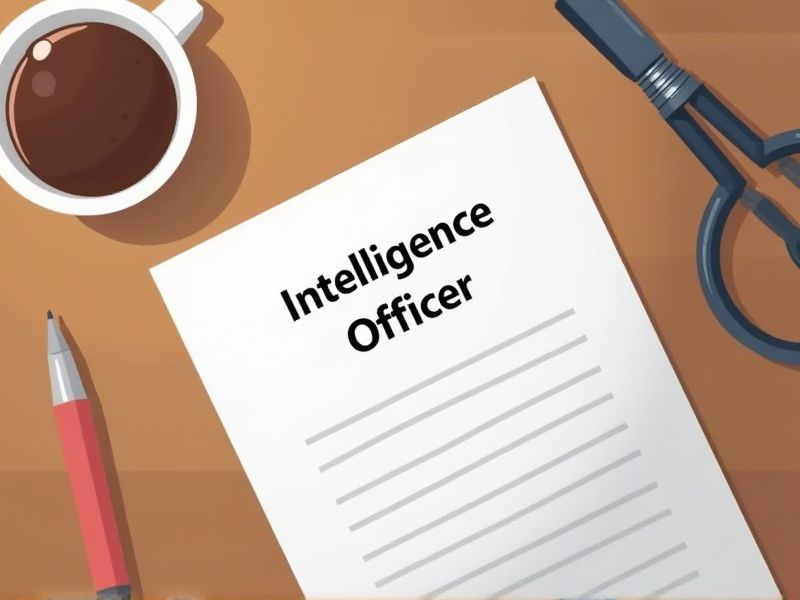
Intelligence Officers operate in high-stakes environments where the accuracy and confidentiality of information are paramount. Acquiring specific certifications enhances their capability to analyze complex data and ensures they adhere to legal and ethical standards. These certifications also equip officers with advanced technological skills necessary for effective intelligence gathering. Here are critical certifications relevant to becoming an Intelligence Officer.
Certified Intelligence Analyst (CIA)
Certified Intelligence Analysts bring essential skills in scrutinizing vast datasets, leading to more accurate threat assessments. Their training enhances strategic decision-making by providing a deeper understanding of information patterns and trends. Certified professionals ensure intelligence reports are both comprehensive and focused, aiding in the prioritization of risks. Continuous professional development increases their ability to adapt to new challenges, making Intelligence Officers more effective in evolving security environments.
Certified Counterintelligence Specialist (CCS)
The role of a Certified Counterintelligence Specialist (CCS) is crucial for an intelligence officer because they possess specialized training to identify and mitigate threats posed by foreign intelligence entities. CCS expertise enhances an intelligence officer's ability to protect national security by preventing espionage and safeguarding sensitive information. Their skills in conducting thorough risk assessments and security evaluations ensure that potential vulnerabilities are addressed efficiently. Collaboration with CCS professionals leads to more robust strategies in counterintelligence operations, thereby fortifying information networks.
Certified Intelligence Professional (CIP)
Certified Intelligence Professional (CIP) credential enhances an Intelligence Officer's credibility and ensures adherence to industry standards. It equips them with crucial analytical skills and knowledge necessary for effective decision-making. This certification signals a commitment to professionalism and ethical intelligence practices. Hiring agencies often regard CIP as a benchmark for competence in intelligence roles.
Advanced Open Source Intelligence (OSINT) Certification
Advanced OSINT Certification equips intelligence officers with enhanced skills to effectively gather and analyze publicly available information. It improves their ability to discern credible sources from disinformation in an era of data overload. Enhanced training in OSINT enables officers to adapt to rapidly evolving digital landscapes and cyber threats. Comprehensive understanding of OSINT techniques ensures improved decision-making and strategic planning for mission-critical operations.
Cyber Threat Intelligence Analyst (CTIA) Certification
The Cyber Threat Intelligence Analyst (CTIA) Certification equips intelligence officers with the skills to effectively analyze cyber threats, enhancing decision-making in cybersecurity. With a structured approach to identifying and mitigating cyber risks, intelligence officers can better protect their organizations' digital assets. The certification's comprehensive curriculum ensures intelligence officers are up-to-date with the latest threat tactics and technologies. Possessing CTIA credentials can elevate an officer's credibility and capability in the competitive field of intelligence and cybersecurity.
CompTIA Security+
The role of an Intelligence Officer often requires a robust understanding of cybersecurity to protect sensitive data from breaches. CompTIA Security+ certification provides foundational knowledge of core security concepts, aligning with the needs of such roles. This certification enhances the officer's capability to identify potential security threats and implement preventive measures effectively. Organizations value CompTIA Security+ as it ensures the personnel can uphold the integrity of critical intelligence information.
Certified Information Systems Security Professional (CISSP)
Obtaining a Certified Information Systems Security Professional (CISSP) certification boosts an Intelligence Officer's credibility by validating their expertise in information security. This leads to enhanced ability in protecting sensitive data, a critical component for national security operations. An in-depth understanding of security protocols aids in identifying and mitigating cyber threats effectively. The synthesis of technical skills and strategic knowledge fosters more informed decision-making in complex intelligence tasks.
Certified Ethical Hacker (CEH)
Intelligence Officers require Certified Ethical Hacker (CEH) certification to gain proficiency in identifying and mitigating vulnerabilities in cybersecurity frameworks. The CEH training equips officers with critical skills in penetration testing, crucial for preempting potential cyber-attacks. Certification ensures adherence to ethical hacking standards, crucial for gathering and analyzing threat intelligence without breaching legal boundaries. Mastery of these techniques enhances an officer's capability to protect sensitive data and support national security initiatives.
Certified Information Security Manager (CISM)
Certified Information Security Manager (CISM) certification equips intelligence officers with advanced knowledge in managing and securing information systems, which is crucial for safeguarding sensitive data in intelligence operations. The credential helps professionals develop a keener understanding of risk management, necessary for identifying and mitigating potential security threats. CISM certification also provides a systematic approach to aligning an organization's security practices with its business objectives, enhancing overall decision-making. Possessing this certification can improve credibility and trust, vital for intelligence officers whose roles demand high levels of confidentiality and ethical standards.
GIAC Cyber Threat Intelligence (GCTI) Certification
The GIAC Cyber Threat Intelligence (GCTI) Certification provides critical skills in analyzing and interpreting threat data, essential for intelligence officers facing evolving cyber threats. Intelligence officers benefit from the GCTI Certification as it enhances their ability to provide actionable insights, which is vital for proactive threat mitigation. Verified expertise in threat intelligence through GCTI elevates an officer's credibility and effectiveness within an organization. Organizations prioritize hiring certified professionals due to their proven understanding of strategic and tactical threat intelligence processes.
Summary
When you obtain certifications as an Intelligence Officer, your skillset becomes more validated and up-to-date. This recognition often enhances career advancement opportunities within the field. Your increased expertise can lead to more effective intelligence assessments and decision-making support. Such credentials typically build trust with peers and superiors, potentially leading to leadership responsibilities.
